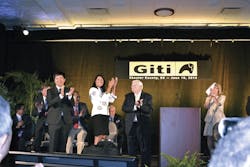Giti Tire Co. Ltd. announced June 16, 2014, that it is building a consumer tire plant in Chester County, S.C. Executives from Giti and its North American subsidiary, Giti Tire (USA) Ltd., joined South Carolina Governor Nikki Haley and state and county officials in announcing the plan.
“The first phase of production capacity is expected to be 5 million tires annually,” said Enki Tan, executive chairman of the Giti Tire Group. “Giti Tire plans to further increase production capacity in response to future market demand and conditions.”
According to Giti, the $560 million tire manufacturing plant is necessary “to meet growing demand in the North American market.” The facility is expected to generate 1,700 new jobs over the next 10 years.
“This significant investment represents our strong commitment to customers in North America,” said Tan. “This is a key milestone for Giti Tire and an important part of our growth strategy worldwide.
“Existing business and strong demand for Giti Tire’s passenger and light truck tires in North America has made this significant investment in South Carolina possible.”
This is the first greenfield project in North America for Giti Tire. The plant will produce passenger and light truck tires for the replacement and original equipment markets. The plant will be built with a focus on maintaining a healthy balance with the environment and following Giti Tire’s green initiatives.
“Chester County is an excellent location for Giti Tire, offering an extensive and efficient infrastructure network including interstate highways, rail, close proximity to airports and a major metropolitan area to support the company’s needs and growth for many years to come,” said Lei Huai Chin, managing director of the Giti Tire Group.
“The new facility will combine a manufacturing plant and distribution center, with a total building area estimated to be 1,800,000 square feet,” said Tom McNamara, executive vice president of sales and marketing for Giti Tire (USA).
Giti Tire (USA) markets and sells high performance, passenger, SUV, light truck and medium truck tires in the United States and Canada. ■
U.S.-made Giti brands: GT Radial, Primewell and Dextero
Following the announcement that Giti Tire Co. Ltd. will build a U.S. plant in Chester County, S.C., Enki Tan, executive chairman of Giti Tire Group, shared his vision of the company’s future in the U.S. market.
“The production will be mainly for the U.S. and Canadian markets. Mexico is possible if an OE company requests it, but right now the current plan is U.S. and Canada. We’ll be making the brands we sell in the U.S. right now, which are GT Radial, Primewell and Dextero.
“The Runway brand is a possibility later, but we’re just going to make three brands for now.”
Tan said initial production will be 5 million PCR and LT tires per year, or 30,000 per day. No dates have been set as to when production will begin, or if it will increase in time.
“We’ll see what the market is like over the next few years and we’ll decide as we go along,” said Tan.
“What we look at is the whole value chain. Automation is one part of it; the manufacturing is one part of it, the logistic costs of shipping raw materials and shipping finished goods. There is time to market; there are the value-added products that we can manufacture in this country.
“We look at a whole series of tangible and intangible aspects of manufacturing and automation is just one part of it.”
Tan said he has three main concerns in the global tire industry. First is volatility in raw material prices, especially natural rubber, because it causes a “whiplash action” in the value chain. Second is overcapacity in some areas.
“The other one is protectionism; we see that creeping in in some areas. The tire industry creates a lot of jobs and it is a conduit to many other industries around. If the tire industry closes down in one area the impact is much larger than the number of jobs it loses. That creates protectionism.
“You need a balance of capacity creation and free trade.”



